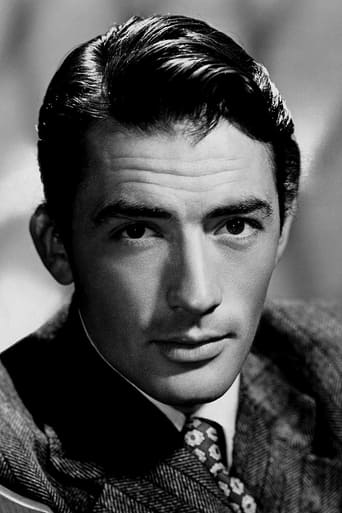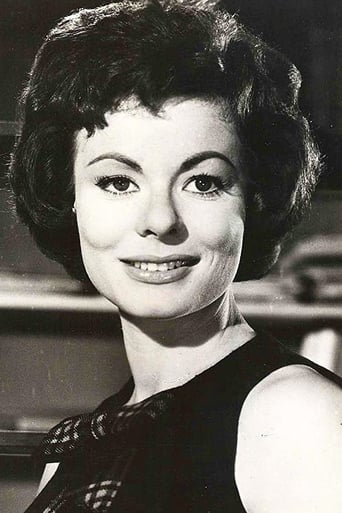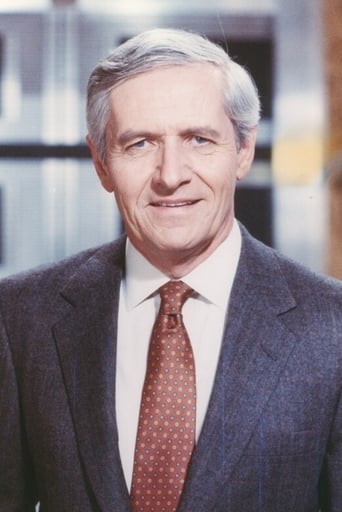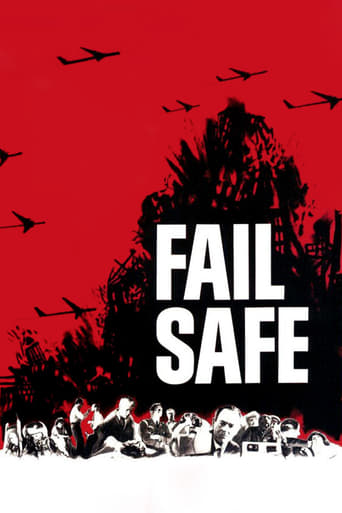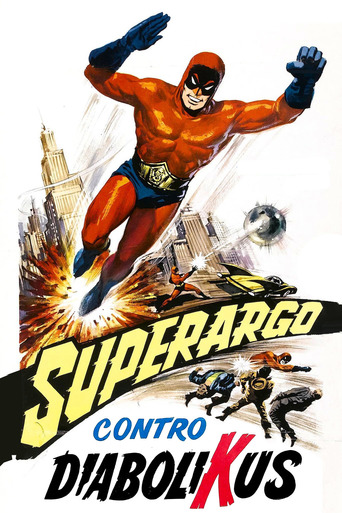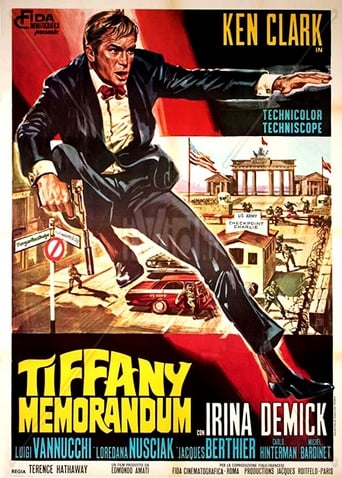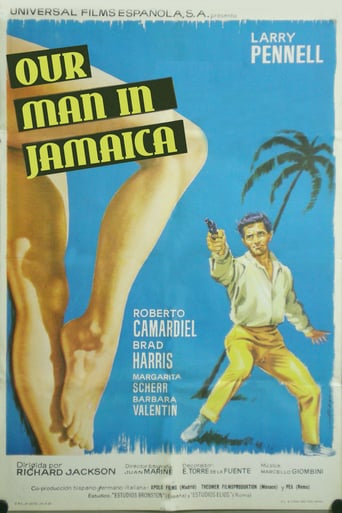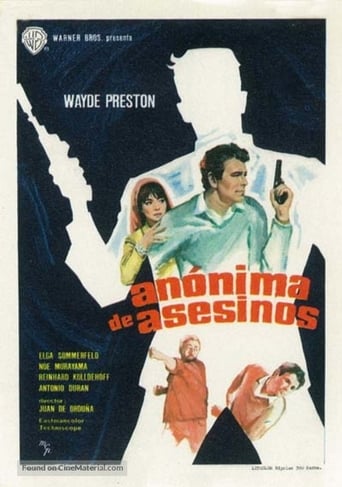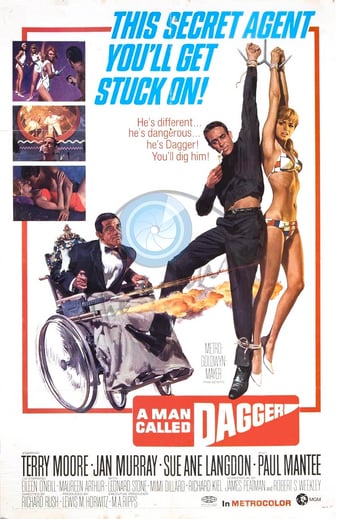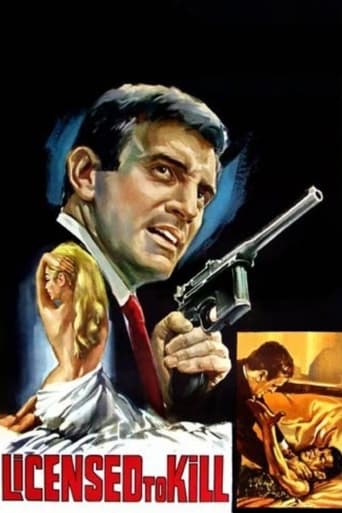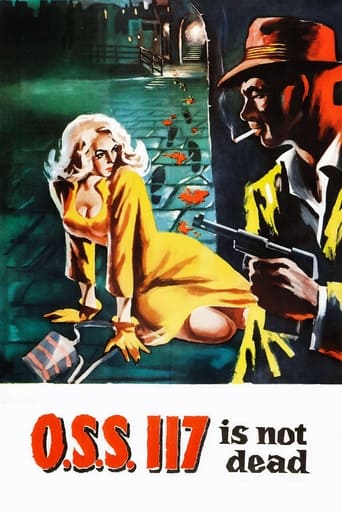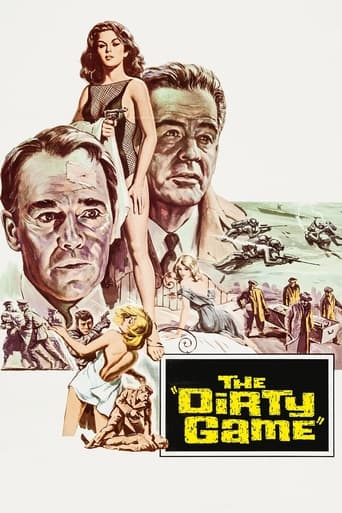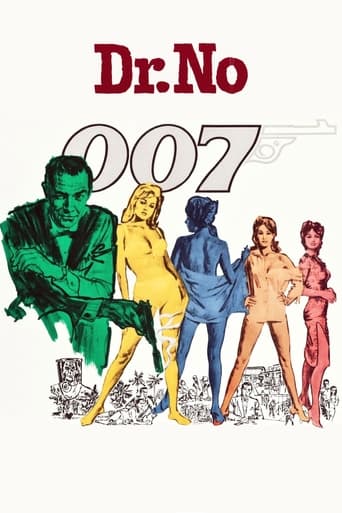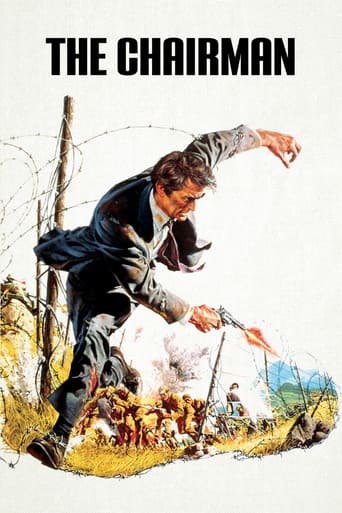

The Chairman (1969)
An American scientist is sent to Red China to steal the formula for a newly developed agricultural enzyme. What he is not told by his bosses is that a micro-sized bomb has been planted in his brain so that should the mission ever look likely to fail, he can be eliminated at the push of a button!
Watch Trailer
Cast


Similar titles
Reviews
Gregory Peck is a Nobel Prize-winning American scientist who has been recruited by the US government to go into China to steal the secret for a new enzyme that would do much to feed the starving of the world. And, oddly, the extremely closed Chinese let him in and wine and dine him. He even gets a nice cozy little audience with the ever-adorable Mao (just because he was responsible for more deaths than Hitler doesn't mean he's not a swell guy in this film). Little does Peck know, however, that the evil US government implanted an explosive device into his skull along with a transmitter (which he does know about). Will they detonate him to kill the Chairman or is there mission the one they stated at the beginning of the film? Considering that the film is about an American espionage agent in Communist China circa 1969, you'd sure think it would be an exciting film. Add to that the talent of Gregory Peck and it seems like a guaranteed winner. Instead, the film just limps along to a less than thrilling and ridiculous conclusion.One of the major problem is that Peck plays a scientist who hates working for US intelligence but has done so in the past. Yet oddly, despite his strong bias against the spy game, he agrees to risk his life by going into China--and you keep wondering why. His motivations seem mixed at best and this is perhaps the worst part of the film. Additionally, as the film progresses, you see that the film makers employ moral relativism--showing the US and China are basically the same. In this film, the US would love to starve the world in order to maintain its power. But comparing Mao's regime (best estimates 25-100 million killed during his rule--I guess you gotta break a few eggs to make this omelet) to the US seemed a bit...well....insane. Throw into the mix that the US and USSR are now good buddies in the film and you are left wondering who, if anyone, to root for in the movie. This really is THE main problem with the film.Another problem, though not as severe, is the relative ease with which Peck enters China and eventually leaves China. You didn't just do this in the 1960s--heck, you don't just do this today! His ease in escaping seemed rather dumb and you know that in reality the Chinese during this time were pretty ruthless and far from dumb. Purges and counter-revolution fever were rampant--as was xenophobia (which, fortunately, has changed a lot over the years). In such a crazed environment, a 6' 3" American would probably be spotted and captured very, very quickly! Overall, this is one of Peck's misfires. The film never seems credible though it is an interesting time-passer provided you don't think through the details too much.
The Chairman (GB title: The Most Dangerous Man In The World) is a typically twisty 60s spy thriller. It feels like a low-key James Bond adventure with a hint of The Man From UNCLE stirred in. Gregory Peck is the hero in this one, but in spite of his star charisma and the fact that the film has a fairly intriguing plot, it still emerges an overall disappointment. Something in the handling just doesn't quite add up maybe it's the way the film twists itself into semi-confusion, maybe it's the clumsy post-production editing which sticks out like a sore thumb, or maybe it's the fact that the sillier aspects of the storyline never quite convince as fully as they're meant to. Whatever the reason, The Chairman falls short of its potential.Dr. John Hathaway (Gregory Peck) is recruited by the CIA for a tricky undercover assignment in Red China. It seems the Chinese have almost perfected an agricultural enzyme that could allow crops to grow in hostile environments like mountains and deserts. Such an enzyme would allow China to gain absolute control of the world's mass food production market. Hathaway is a close friend of the man who invented the enzyme, revered Chinese professor Soong Li (Keye Luke). He is also considered by the Chinese as the one man who can help them to add the finishing touches to the formula. This is great news for the CIA, who need someone they can send into China to get close to those involved in the production of the enzyme without arousing suspicion. Hathaway agrees to do the job for them, and a microchip transmitter is implanted into his head which is capable of visually and aurally relaying everything he witnesses during his time in China. What Marshal Shelby (Arthur Hill) of the CIA doesn't tell Hathaway is that the transmitter in his brain is also wired up to a small explosive device, so that if the mission looks destined to fail or if it looks like he might fall into enemy hands his head can be blown off at any time simply by pushing a button! The best thing about the film is Jerry Goldsmith's rousing music score, which adds excitement to scenes that actually, on most occasions, aren't very exciting. In spite of the fact that Peck is in continuous danger virtually every moment that he's in China, the film somehow slackens the suspense when it should be tightening it. Long periods of the film are tedious and uninvolving. Peck gives a passable performance as the unsuspecting "walking bomb", even though he's not really the right actor for the role, while Arthur Hill's eye-patched official overseeing the operation might have stepped right out of a book of spy movie clichés. In the finale, Hathaway flees for the border with the Chinese army in hot pursuit, while Shelby's finger hovers perilously over the all-important bomb button. It's a reasonably taut climax, but comes too late in the day to save the film as a whole. In summary, The Chairman has a few highlights but generally speaking it's one of those films that could have, and should have, been better!
***SPOILERS*** Cold War espionage drama with the US and USSR working as a team to prevent the Communist Chinese from developing this enzyme that would make crops in both cold and high altitude, like barren snow capped mountain ranges, weather resistant. This amazing discovery would give the Chinese Communists a monopoly in food-stuffs industry all over the world. They would also be able to use it to blackmail, or buy off, all of the free and third world nations by undercutting the food prices of the United States and Western Europe as well as the Soviet Union. The Chinese who developed this enzyme with the help of their top scientist Soing Li,Keye Luke,need just one more piece of this growth enzyme puzzle to really get their act on the road to world domination by controlling the worlds food supply: Mass Production. Both the US and USSR are very determined to get their hands on this enzyme and use the one person who can get into Communist China American Prof. John Hathway, Gregory Peck. Prof. Hathway is not only an expert in the field of growth enzymes but also a former associate of the imminent Prof. Soing Li. Only Prof. Hathaway can come up with the formula to mass produce this enzyme which is why the Chairman, Conrad Yama, of the Chinese Peoples Republic eagerly wants him to come to his country and help out Prof. Li with his experiment.Using the code name "Minitor" the US intelligence service, the CIA, implant a transmitter into Hathaway's head to pick up all the things that he sees and hears in China as well as all his conversations that he has with that country's high echelon governments officials like the Chairman. What Prof. Hathaway doesn't know is that besides a transmitter he also has an explosive device in his skull that can blow his head off as soon as the Chinese suspect that he's a spy for the US. Prof. Hathaway's main goal in his China visit is to get his hands on the secret enzyme formula but it's encased in the wall of Prof. Li's house and almost impossible for him to get at. Later Hathaway, by crawling under the floorboards and melting the encased steel-box with acid, did get into the hidden compartment where he thought that the film of the enzyme was. Prof. Hatawy is shocked to find that it's no longer there. Prof. Li had since been accused of being a traitor to the people and forced from his post, by the Red Guard, as a top Communist Chinese in the education and scientific departments. Hurt and humiliated Prof. Li, who was forced to be exhibited around town wearing a dunce cap, with signs calling him a traitor,later commits suicide leaving his daughter Ting Ling, Zienia Merton, his most precious possession: the little Red Book of quotes of Moa Tse-Tung. Unknown to Prof Hathaway is that in that book Prof. Li skillfully and in a code, that only he and Prof. Hathaway can decipher, is the secret enzyme formula. Unusual film made during the hight of the Cold as well as Vietnam War back in 1969 with Prof. Hathaway driving an armored car and then running for his life towards the Russian-Mongolian/Communist Chinese border with a bomb planted in his head that can go off at any given moment. With the bomb about to be detonated by those who sent him there into Communist China: His government the US as well as the USSR & UK. The Soviet Red Army who's job it was to get Prof. Hathaway across the border safely were also saddled with the order of not firing on the perusing Chinese Red Army troops. This in order to prevent a war from breaking out between the two Communist super-powers! Which made things in the movie even more complicated then they already were!
This movie is a relic of its day, reflecting the cold war paranoia that was already rather quaint by 1969. This sort of undercuts the film as anything to be taken seriously, but fortunately it's reasonably well-acted and directed so it still holds up as mildly entertaining -- if there's nothing better on TV to watch. Of historic note is that this film was produced by the same guys who made the much more memorable "Planet of the Apes" a year earlier (both films were scored by the great Jerry Goldsmith), and one of the sets is left over from "Fantastic Voyage."


